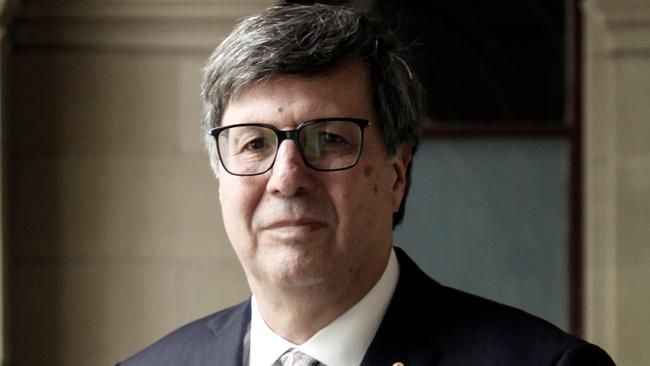George Pell’s ‘road map’ to High Court

The head of the Victorian Bar says dissenting Court of Appeal judgments often become road maps for High Court applications, as the minority view of judge Mark Weinberg looms as key to any attempt to overturn George Pell’s sex crime convictions.
Lawyers for Pell are expected to seek leave to appeal to the High Court in coming weeks in what will be the cardinal’s last hope of being freed from jail before the end of his three year and eight months minimum sentence for sexually abusing two choirboys.
Victorian Bar Association president Matt Collins QC said it was difficult to predict which cases the High Court granted leave, with the court typically approving just 15 per cent of applications.
He said dissenting judgments often read “like a road map for appeal”, with Justice Weinberg’s judgment differing strongly from the majority judgment in two areas.
Dr Collins said chief judge Anne Ferguson and judge Chris Maxwell thought uncertainties in the recollections of the Pell complainant reinforced the victim’s credibility.
In contrast, he said Justice Weinberg thought there were “too many discrepancies and uncertainties to put to one side”.
“I’m sure that’s one major area Cardinal Pell’s team will be looking at,” he said.
Another point of difference was the impossibility or otherwise of the crime, Dr Collins said.
He said the majority judgment determined each of the 13 factors advanced by the defence as impossible were in fact possible.
“Justice Weinberg had a radically different approach to the same facts,” Dr Collins said.
He said Justice Weinberg considered the improbability multiplied as the different factors were aligned.
To obtain special leave to appear before the High Court, a matter must involve a question of law that is of public importance, be necessary to resolve differences of opinion between different courts, or within one court, as to the state of the law and be in the interests of the administration of justice.
It is likely that Pell will be represented by Sydney silk Bret Walker but preparation for the appeal, which must be filed in 28 days, is still under way.
Supporters of Pell, 78, were shattered his appeal failed, which reinforced the five jury convictions relating to sex abuse in St Patrick’s Cathedral in 1996 and 1997.
The majority verdict accepted the evidence of the sole surviving choirboy, who told the County Court of horrific abuse including forced oral sex, masturbation and groping.
Federal Attorney-General Christian Porter yesterday stridently defended the jury system because he said it represented the views of ordinary Australians.
“I mean, I’ve got a great deal of faith having been in the court system, in the jury system,’’ he said.
“It’s got a wisdom and a resilience that you don’t get from simply having the trials, I think, perpetually by a judge alone.
“So at the trial level you had jurors who are ordinary Australians from every conceivable walk and part of Australian life who sat together and listened to weeks and weeks of evidence and then deliberated through a very long period of time and made a determination.’’
Deakin Law School associate professor Theo Alexander said there were a number of factors that would suggest the High Court would be disinclined to grant special leave to appeal to Pell. “I just don’t think this case is unusual for sex crimes, that the conviction is unintelligible,” he told The Australian.
Dr Alexander said it seemed to always be difficult to ask an appeals court to interfere with a jury verdict.
“Unless the version of events given by the complainant is preposterous, riddled with anomalies, unless they appeared evasive or overtly dishonest, then it’s a big ask to expect a (group of judges) would have a better assessment than the jury,” he said.
He also said it was “extremely difficult” to ask the High Court to intervene in a “very reasoned, rational decision” of another court.
“This is a huge judgment about a very simple issue, which is, was the complainant to be believed?”


